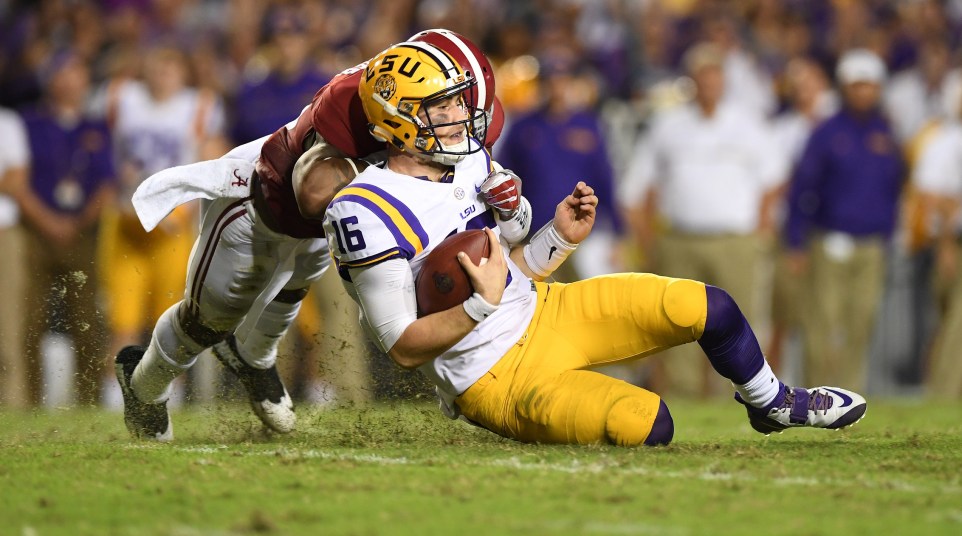
No call or no-call decided LSU's loss to Alabama in Tiger Stadium
If you watched LSU defensive end Lewis Neal play Saturday against Alabama, you have to like him as a player.
You also have to like how he deals with controversy. What Neal is is a guy with a relentless motor and a knack for making plays.
What he’s not is a guy who makes excuses.
The Crimson Tide struggled to block him all night in Alabama’s 10-0 win as he finished with 11 tackles, an unusually high number for a 3-4 defensive end. One was for a loss, and he also was credited with two quarterback hurries.
But one tackle he didn’t make was on the game’s lone touchdown, a 21-yard scamper by quarterback Jalen Hurts in the fourth quarter. As Hurts rolled out to look to pass, Neal comes unblocked from outside until he is met deep in the backfield by running back Bo Scarbrough, who Neal beats to the outside forcing Scarbrough, by all appearances on the replay, to grab him.
Hurts cuts inside the block where Neal appeared to have an angle to take him down, except Scarbrough has him from behind. Hurts goes on to score, untouched.
Was it a hold? Neal, to his credit, wasn’t about making excuses Monday.
“There are a lot of things that could have been done differently,” he said when asked about the no-call. “I don’t make excuses. That’s just me as a player. I just have to execute and make that play.”
His coach was not so diplomatic. While he didn’t address the hold directly, LSU interim head coach Ed Orgeron did note that he would inquire about several calls from the Alabama game.
“We have several (calls) we’re going to send over to the league office,” Orgeron said. “I usually don’t do it, but this week I did. But I think there were some very questionable things out there that happened, and I would like to know the explanations.”
Was it a hold? My initial reaction when watching the play develop live was to say, “This is coming back. There was a hold.” Then, I was surprised not to see a flag.
But at the same time, I wasn’t outraged by it. Calls are missed during the course of a game, even by the best crews having their best days. As they say, holding can be called on just about any play (but I will say, a call that happens right where the play is developing really should be called).
Neal certainly wasn’t blaming a no-call for the outcome.
“I feel like if that play is made, (the score would still be) 0-0,” he said. “But I just have to keep moving forward and deal with what the refs call. They call the game, I don’t. You just have to keep playing.”
These things, after all, do tend to even out.
With 3:11 left in the game and Alabama leading 7-0 and driving for more, facing 3rd-and-goal at the LSU 2, Crimson Tide left guard Ross Pierschbacher was called for a false start. But on replay, there was no indication Pierschbacher jumped, flinched or anything else that would warrant the flag.
And Alabama went on to settle for a field goal.
Let’s say, for the sake of argument, LSU blocked that field goal and ran it back for a touchdown, then went on to win in overtime.
Today, we wouldn’t be hearing about the hold on Neal. We’d be hearing about the phantom false start that forced Alabama to have to try a field goal that LSU blocked.
We aren’t hearing about that false start because Alabama won. We are hearing about the hold because LSU lost.
And that’s the way it goes.
You hear more conspiracy theories about calls Alabama gets for one reason: The Crimson Tide usually win its games, and you rarely hear about calls that hurt the team that eventually wins a close game. That team won, so why would it complain? You usually hear about the ones that hurt the loser because the argument is the bad call swayed the outcome of the game.
“The refs stole it from us,” they say.
Does that mean Orgeron shouldn’t bring up the call with the SEC office?
Of course he should bring it up. And he should bring up the unnecessary roughness call on LSU’s Devin White in which he hit Hurts on the sideline on the same drive. It was borderline and earlier in the game, when Tigers quarterback Danny Etling was hit while sliding at the end of the run, there was no call.
That was also borderline.
So absolutely bring it up. It’s all part of an accountability process, and it’s also how you learn how the league officials are interpreting certain calls.
But here’s the thing: No call decided the game. Alabama won because it managed some offense late where the Tigers did not.
Period. End of story.
